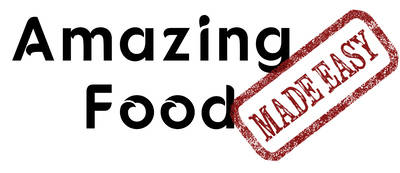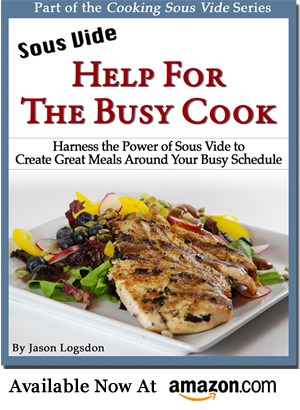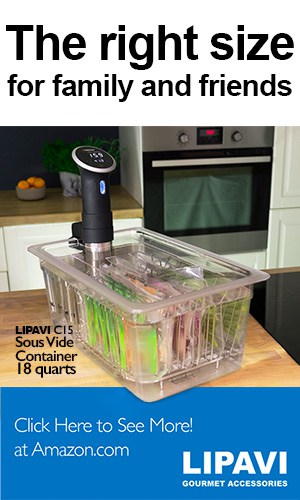-
Sous Vide Time and Temperatures
Sous Vide Time and Temps
Sous Vide Time and Temps
Sous Vide Temps
- All Sous Vide Temperatures
- Sous Vide Beef Temperatures
- Sous Vide Chicken Temperatures
- Sous Vide Duck Temperatures
- Sous Vide Fish Temperatures
- Sous Vide Vegetables Temperatures
- Sous Vide Infusions Temperatures
- Sous Vide Lamb Temperatures
- Sous Vide Pork Temperatures
- Sous Vide Shellfish Temperatures
- Sous Vide Turkey Temperatures
- Recipes Recipes Recipes Recipes
- Getting Started Guides Getting Started Guides Getting Started
- Equipment and Tools Equipment and Tools Equipment Equipment and Tools
- More Resources More Resources Resources More Resources
Sous Vide Salmon Safety
More Sous Vide Safety
•
Sous Vide
Click here to get great sous vide content via email
Lately on the sous vide mailing list there has been a discussion about safety with regards to cooking salmon with sous vide, especially when done "mi-cuit" or partially cooked. The two main concerns are the parasite Anisakis simplex and botulism. We try to address some of the concerns here.This post may contain affiliate links. Read more.
Written by Jason Logsdon
As always, please remember:
Sous vide is a new and largely untested method of cooking. It carries many inherit health risks that may not be fully understood. The information on this site is for informational purposes only. Anyone undertaking sous vide cooking should fully inform themselves about any and all risks associated with it and come to their own conclusions. Following anything on this site may make you sick and should only be done if you are fully aware of the potential complications.This information, as well as over 100 recipes, is available in our book Beginning Sous Vide which you can get at Amazon.com or as a pdf download.
Botulism in Sous Vide Salmon
As long as you are eating the salmon as soon as it is done cooking the risk of botulism is very small. This is because the salmon is normally cooked for a short enough period of time that the botulism will not have time to spread. However, if you have the salmon out for over 2 hours then the risk of botulism begins to increase. Feel free to consult the Practical Guide to Sous Vide for more information on decreasing botulism.Anisakis Simplex in Sous Vide Salmon
Anisakis simplex is a very common parasite that has been found in around 75% of wild salmon. Normally, salmon is cooked above 140F killing the Anisakis. However, many sous vide salmon recipes call for it to be cooked at lower temperatures, greatly increasing the danger of being infected.The easiest way to kill the Anisakis parasite is to freeze the salmon before you cook it. Freezing kills the Anisakis and its larve. The FDA guideline is to freeze the salmon at -4F for 7 days and the European Union regulation is -4F for 24 hours.
Before trying to freeze the salmon yourself you should be sure to run a test on your freezer to ensure that it goes at least as low as -4F.
If you are cooking the salmon above 140F then the salmon should be fine and the freezing would be unnecessary.
General Sous Vide Salmon Safety
Douglas Baldwin had this to say about sous vide salmon safety:I like to pasteurize all my fish and shellfish. I do this by cutting the fish into individual portions and cooking them in a 140F (60C) water bath for 40--50 minutes. I use 140F (60C) because the fish becomes mushy at lower temperatures (since it takes much longer to pasteurize) and dry at higher temperatures (since the muscle fibers contract and squeeze out the water held between them). I find that 140F (60C) for 40-50 minutes gives safe, moist, and flaky fish.And from his Practical Guide to Sous Vide:
While salmon mi-cuit is a popular among sous vide enthusiast, it should never be served to immune compromised individuals. The low cooking temperatures in this recipe are not sufficient to reduce the number of food borne pathogens or parasites. Since the prevalence of the parasite Anisakids simplex may exceed 75% in various types of fresh U.S. commercial wild salmon (National Advisory Committee on Microbiological Criteria for Food, 2008), I recommend either freezing the fish (below ?4?F/?20?C for at least 24 hours) to kill the parasites or pasteurizing the fish using the times and temperatures in Table 3.5.He also points out that if you buy sushi grade salmon you can cook it at a lower temperature for a shorter amount of time. However, if he buys sushi-grade salmon he prefers to just eat it raw.
 This article is by me, Jason Logsdon. I'm an adventurous home cook and professional blogger who loves to try new things, especially when it comes to cooking. I've explored everything from sous vide and whipping siphons to pressure cookers and blow torches; created foams, gels and spheres; made barrel aged cocktails and brewed beer. I have also written 10 cookbooks on modernist cooking and sous vide and I run the AmazingFoodMadeEasy.com website.
This article is by me, Jason Logsdon. I'm an adventurous home cook and professional blogger who loves to try new things, especially when it comes to cooking. I've explored everything from sous vide and whipping siphons to pressure cookers and blow torches; created foams, gels and spheres; made barrel aged cocktails and brewed beer. I have also written 10 cookbooks on modernist cooking and sous vide and I run the AmazingFoodMadeEasy.com website.
Affiliate Disclaimer: Some links on this site might be affiliate links that if used to purchased products I might receive money. I like money but I will not endorse something I don't believe in. Please feel free to directly go to any products I link to and bypass the referral link if you feel uncomfortable with me receiving funds.













